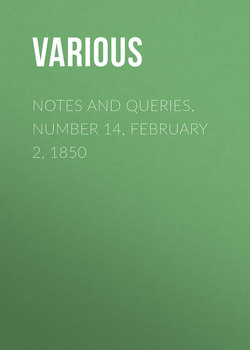Читать книгу Notes and Queries, Number 14, February 2, 1850 - Various - Страница 5
NOTES
THE PURSUITS OF LITERATURE
ОглавлениеMany years ago, the satirical poem, entitled The Pursuits of Literature, engaged public attention for a very considerable time; the author concealed his name; and from 1796 at least to 1800, the world continued guessing at who could be the author. Amongst the names to which the poem was ascribed were those of Anstey, Colman, Jun., Coombe, Cumberland, Harry Dampier, Goodall, Hudderford, Knapp, MATHIAS, Mansell, Wrangham, Stephen Weston, and many others, chiefly Etonians. George Steevens, it is believed, fixed upon the real author at an early period: at least in the St. James's Chronicle, from Tuesday, May 1. to Thursday, May 3. 1798, we find—
"THE PURSUER OF LITERATURE PURSUED
"Hic niger est.
"With learned jargon and conceit,
With tongue as prompt to lie as
The veriest mountebank and cheat,
Steps forth the black –.
"At first the world was all astounded,
Some said it was Elias;
But when the riddle was expounded,
'Twas little black –.
"This labour'd work would seem the job
Of hundred-handed Gyas;
But proves to issue from the nob
Of little black –.
"Through learned shoals of garbled Greek
We trace his favourite bias,
But when the malice comes to speak,
We recognise –.
"What strutting Bantam, weak but proud,
E'er held his head so high as
This pigmy idol of the crowd,
The prancing pert –.
"[Greek: Touto to biblion], he'll swear,
Is [Greek: plaeron taes sophias],
But men of sense and taste declare
'Tis little black –.
"Oh! were this scribbler, for a time,
Struck dumb like Zacharias,
Who could regret the spiteful rhyme
Of little black –.
"Small was his stature who in fight
O'erthrew the great Darius
But small in genius as in height
Is little black –.
"Say, could'st thou gain the butt of sack
And salary that Pye has,
Would it not cheer thy visage black,
Thou envious rogue –.
"When next accus'd deny it not!
Do think of Ananias!
Remember how he went to pot,
As thou may'st, friend –.
"BARACHIAS."
I am, &c., your humble servant,
H.E.
